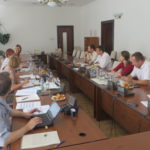Reminder about the working group meeting
Szabolcs Hancsók welcomed the participants at the beginning of the meeting, then Gyula Ocskay introduced the Legal Accessibility project, whose aim is to propose legal and policy recommendations in order to reduce the dividing effects of the borders, thus improving the living conditions of people who live in border areas. As it was mentioned at the meeting, several attempts have been made in order to address the problem of cross-border trade of local products, but the attempts were unsuccessful, so far.
Subsequently, the following topics were discussed by the participants:
I. Discussed topics at the meeting
Regulating environment: the problem is that most of the countries have different legislative regulation of (small-scale) producers. The definition itself is also different in most of the countries, hence it is appropriate to avoid using the term ‘small-scale producer’, rather the focus should be taken on ‘selling to a direct end user’. For example, it is known that the Slovak legislation is much stricter than the Hungarian one. The regulative environment differs from country to country and this makes the harmonization harder, i.e. there is a need to find the way of harmonization with at least 5 EU neighbouring member states. The easiest way would be to make a legislation on the EU level. At the same time, a training system, Better Food, exists in the EU, and the Flexibility training showed that there are different ideas for small-scale producers in each country.
Regulatory flexibility: the basis for applying the principle is the local tradition, traditional raw materials and the existence of special producing processes and their respect (small scale sales!). Transport of local food across borders questions this principle. Selling of local products is also based on customer trust. Although, this is not denied by the cross-border sale.
Food safety: the risk is embodied by the track of the food which comes from the area beyond the border is unable to control. It is not possible to exactly know whether the product was produced by the selling person or not. The Slovak produces are registered and controlled by the domestic authorities. There is no possibility to register the foreign producer in the Hungarian register. There would be a need to have an access to each other’s database. There is a need to ascertain whether the given producer is entitled to sell his products and whether the given product is not harmful to health (traceability).
Healthy food: following the request of the Minister, a working group has been recently established for this topic. However, the group has failed to define what can be considered to healthy food. Consequently, it is not appropriate to refer on this; although, the Constitution contains the right to have access to healthy foods. The reference is weakened by the fact that the article XX mentions the basic rights, but concrete measures cannot be deduced from it. The use of the term also requires caution in the sense that healthy food cannot be produced only by a small-scale producer.
Territoriality / extra territoriality: administrative barrier of the border creates discrimination – as every national legislation do. Nevertheless, the Constitution of Hungary and other laws (e.g. law on citizenship) apply extraterritorial provisions. The possible solution cannot include any national discrimination, but the Hungarian citizenship cannot be a criterion either. The regulation of the local producer market should be amended, and the Ministry of National Economy will address it, too.
Concurrency: appearance of sellers from the area beyond the border represent a concurrency for the domestic producers. It is a fact that many small-scale local markets have developed in recent years. Many of them have few vendors and expansion of the potential vendors may improve the situation. At the same time, the unilateral amendment of the Hungarian legislation, without accepting mutuality, could generate disadvantage for the Hungarian producers. Important aspect is the question of regularity and quantity of selling – especially, for the protection of the Hungarian producers. An example of foreign selling exists, e.g. somebody from the Board Member of the Kislépték (in English: National Association of Interest Representations for Small-scale producers and service providers) sells products in Austria. If selling activity takes place, it has to be done with the same conditions as the Hungarian producers do it.
II. Suggestions for further continuation
1) Do not include the non-EU neighbour countries.
2) In parallel with the legal analysis, a questionnaire survey should be implemented among the domestic producers and consumers on the question, how would they relate to the proposed derogation. (Kislépték and CESCI make a joint proposal for the questionnaire, but everyone can comment it).
3) We should not focus on legal harmonization, but we should try to modify the Hungarian regulation, hence approaching toward the least resistance. In order to ensure mutuality, the Hungarian proposal may be the starting point for negotiations with the neighbouring countries.
4) The proposal should be applied only to cross-border sales in Hungary, thus the approval is linked to km distance that may reduce competition. There is no need to modify the smalls-scale producer regulation.




The following participants were present:
- The following participants were present:
- Dr. Ágota Balázs, Ministry of Agriculture
- Ferenc Deák, Ministry of Agriculture
- Dr. Szabolcs Hancsók, Ministry of Agriculture
- Dr. Norbert Jankai, CESCI
- Szilvia Kovács, Első Magyar Kert Szövetkezet and Kislépték
- Gergely Lantos, Ministry of Agriculture
- Dr. Ágnes Major, lawyer
- Dr. László Matus, Ministry of Agriculture
- Gyula Ocskay, CESCI
- Andrea Szabadkai, Kislépték
- Erika Székely, Hungarian Chamber of Agriculture
- Edina Szomi, Hungarian Chamber of Agriculture